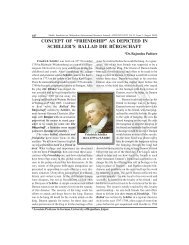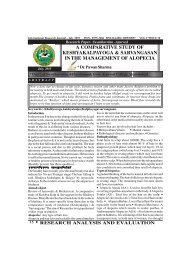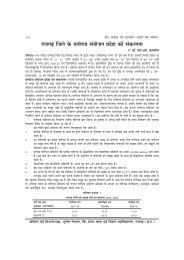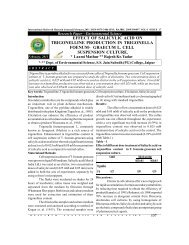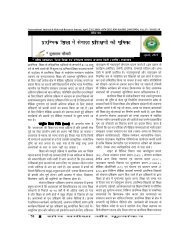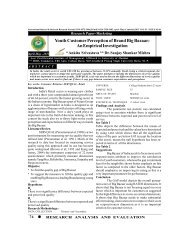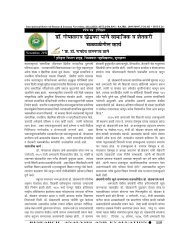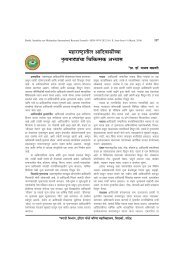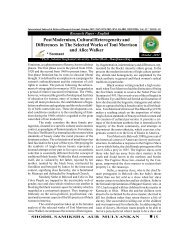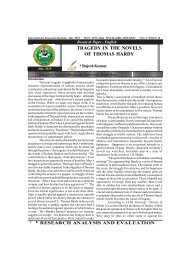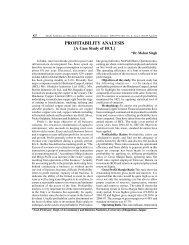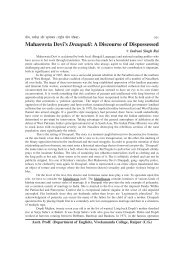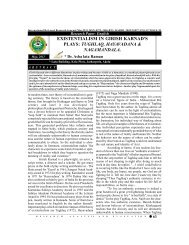Implications of Career Dimensions Quality of Work Life
Implications of Career Dimensions Quality of Work Life
Implications of Career Dimensions Quality of Work Life
You also want an ePaper? Increase the reach of your titles
YUMPU automatically turns print PDFs into web optimized ePapers that Google loves.
International Referred Research Journal,September ,2011,ISSN-0975-3486, RNI: RAJBIL 2009/30097, VOL-II *ISSUE 24<br />
September, 2011<br />
Research Paper—Management<br />
<strong>Career</strong> and QWL:<br />
A career is the evolving sequence <strong>of</strong> a person's<br />
work experiences over time. <strong>Career</strong> arises from the<br />
interaction <strong>of</strong> individuals with organizations and society.<br />
<strong>Career</strong> is not a primarily a theoretical construct<br />
but is used in meaningful ways, given meaning and it<br />
creates meaning and also experience. More specifically,<br />
career is referred to as a succession <strong>of</strong> related<br />
jobs, arranged in a hierarchy <strong>of</strong> prestige, through which<br />
persons move in an ordered, predictable sequence.<br />
There is also another side <strong>of</strong> career which linked to the<br />
individual's "moving perspective" on their life and its<br />
meaning. <strong>Career</strong> satisfaction is defined as the satisfaction<br />
individuals derive from intrinsic and extrinsic<br />
aspects <strong>of</strong> their careers, including pay, advancement<br />
and developmental opportunities. This is in contrast<br />
to job satisfaction defined as pleasurable or positive<br />
emotional state resulting from an appraisal <strong>of</strong> one's job<br />
or job experiences.<br />
Pay and perceived promotion opportunities are important<br />
determinants <strong>of</strong> career satisfaction in economic<br />
considerations. Organizational characteristics such as<br />
organizational emphasis on human resources, fairness<br />
<strong>of</strong> practices and policies regarding living conditions<br />
and family issues were also important. Family<br />
life includes support from spouse and personal flexibility<br />
which had been found to be an important determinant<br />
<strong>of</strong> career satisfaction. As individuals reached<br />
their<br />
Maturity stage <strong>of</strong> their careers, they have been<br />
found to place a greater emphasis on a balance between<br />
their work and family lives that individuals place<br />
on their family role as they age; the career satisfaction<br />
<strong>of</strong> older individuals is likely to be more negatively<br />
affected by work-family conflict than that <strong>of</strong> younger<br />
individuals. Some research indicates that a happy family<br />
life correlates with high levels <strong>of</strong> job satisfaction<br />
and objective career success. Rapoport and Rapoport<br />
supported this by showing that the family's morale<br />
support and the diversion that it entails make it an<br />
important factor Affecting QWL.<br />
Research also suggests that job tenure and total time<br />
in one's occupation are positively related to career<br />
<strong>Implications</strong> <strong>of</strong> <strong>Career</strong> <strong>Dimensions</strong><br />
<strong>Quality</strong> <strong>of</strong> <strong>Work</strong> <strong>Life</strong><br />
* Mr.P.Yuvarman ** Mr.N.Akbarjan<br />
* Asst. Pr<strong>of</strong>. Dept. <strong>of</strong> Management Studies Vel Tech Dr.RR & Dr.SR Technical University, Avadi,<br />
** Asst. Pr<strong>of</strong>. Dept. <strong>of</strong> Management Studies Vel Tech Dr.RR & Dr.SR Technical University, Avadi,<br />
success/achievement besides the number <strong>of</strong> hours<br />
worked per week and salary and ascendancy. A positive<br />
relationship between ambition and career<br />
success has been found in several studies <strong>of</strong> managers<br />
and executives. In respect to career balance, it recognizes<br />
that sometimes there is a conflict between personal<br />
life and work and differences in perceptions <strong>of</strong><br />
success in life. Two important focal points <strong>of</strong> adult life<br />
are family and work.<br />
Propositions:<br />
With justification from the literature, it is<br />
reasonable to suggest that aspects <strong>of</strong> career development<br />
with reference to career satisfaction and career<br />
achievement are factors likely to have impact on QWL.<br />
Likewise, career balance with the rising indication <strong>of</strong><br />
conflict between work and family life is also proposed<br />
as another factor determining QWL. The key elements<br />
in QWL include decision participation, restructuring<br />
the nature <strong>of</strong> the work, enhancing the work environment<br />
and defining the reward structure. As pointed<br />
out in the literature, QWL reflects a concern for people's<br />
experience at work, their relationship with other people,<br />
their work setting and their effectiveness on the job.<br />
QWL activity involves improvements in the workplace,<br />
with particular emphasis on physical work and<br />
the circumstances surrounding it. So, changes in rules,<br />
conditions, hours and other aspects <strong>of</strong> the environment<br />
are at issue. Reward system is essential in promoting<br />
a climate <strong>of</strong> involvement and career satisfaction.<br />
Research method:<br />
This study employed the survey method that<br />
allow for broad coverage, flexibility and convenience<br />
with inputs on related populations or events. Collection<br />
<strong>of</strong> data was self-administered to determine the<br />
level <strong>of</strong> QWL. Participation was granted through prior<br />
appointments and consent via phone calls from the<br />
organization. Each organization was visited at least<br />
twice by the researcher to establish rapport and reinforce<br />
contacts with the top management and related<br />
personnel to ensure smooth implementation <strong>of</strong> the questionnaire<br />
distribution and collection. A third visit was<br />
made to ensure a degree <strong>of</strong> interest and commitment<br />
R E S E A R C H A N A L Y S I S A N D E V A L U A T I O N<br />
84
International Referred Research Journal,September ,2011,ISSN-0975-3486, RNI: RAJBIL 2009/30097, VOL-II *ISSUE 24<br />
on the part <strong>of</strong> the respondents to collect the questionnaires<br />
if data collection was not possible the second<br />
round, in addition to follow-up appeal via phone calls.<br />
Questionnaires that are not received after the fourth<br />
week were classified as non-respondents.<br />
Instrument development:<br />
Since this research is not a replication <strong>of</strong> any<br />
previous studies, the questionnaire was developed<br />
through literature review and a mix and match approach<br />
was undertaken to modify the sentence or complete<br />
withdrawal wherever necessary to suit the local<br />
context. While academics assisted in assessing face<br />
validity, the managerial pr<strong>of</strong>essionals in a multinational<br />
corporation verified content validity. The final<br />
questionnaire was pre-tested on 19 managers. The<br />
coefficient values were all above 0.8, thus meeting<br />
Nunnally's recommendation <strong>of</strong> > 0.7 as the acceptable<br />
reliability level. The overall alpha value was .8768.<br />
The final questionnaire had a total <strong>of</strong> 73 items measuring<br />
six constructs (five independent and onedependent).<br />
Conclusion:<br />
Past studies indicate that family roles reflect<br />
needs, opportunities and constraints have influence on<br />
individuals' reactions to work. After all, two important<br />
focal points <strong>of</strong> adult life are family and work. The role<br />
expectations <strong>of</strong> these two domains are not always compatible<br />
thus creating conflicts. These conflicts are related<br />
to outcomes such as job dissatisfaction, job burnout<br />
and turnover, as well as to outcomes related to<br />
psychological distress e.g. depression and life and<br />
marital dissatisfaction. <strong>Work</strong>-family conflict studies<br />
have contributed to a better understanding <strong>of</strong> role conflict<br />
and its impact on mental health and the quality <strong>of</strong><br />
work life. By mutually solving work-related problems,<br />
building cooperation, improving work environments,<br />
restructuring tasks and carefully and fairly managing<br />
human resource outcomes and pay<strong>of</strong>fs, QWL programs<br />
will benefit both labor and management.<br />
R E F E R E N C E<br />
Wozner, Y. (1982). Assessing the quality <strong>of</strong> internat life. Human Relations, vol. 35 (11): 1059-1072. Shye, S. (1988). <strong>Life</strong> <strong>Quality</strong> and<br />
environmental conditions in a distress neighborhood: evaluation by the systemic quality <strong>of</strong> life model. Megamot, 31, 439-449<br />
85<br />
R E S E A R C H A N A L Y S I S A N D E V A L U A T I O N



